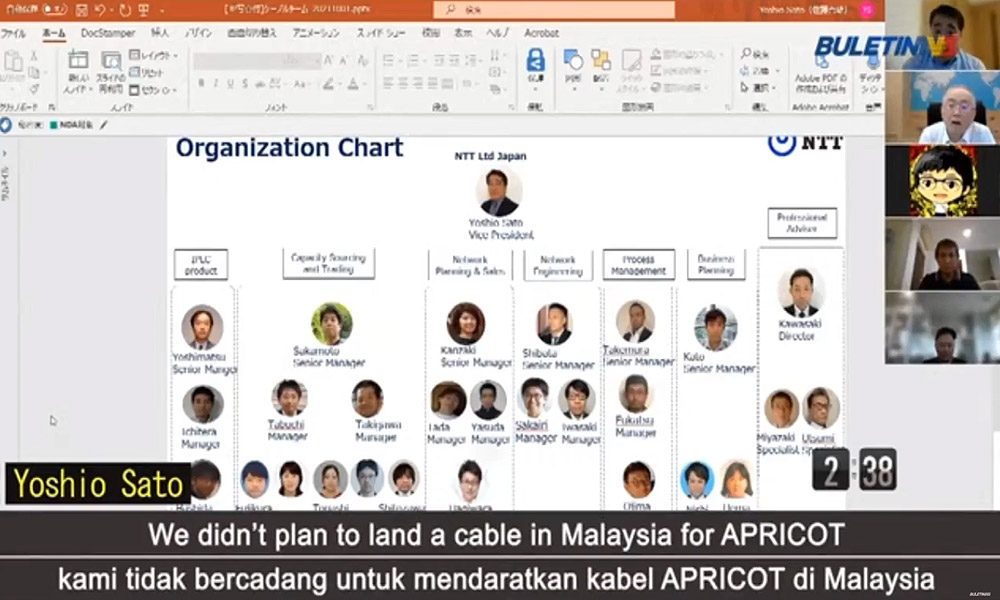Recorded video call gives Wee upper hand in cabotage debate
Transport Minister Wee Ka Siong seemed to have the upper hand in last night's debate with former finance minister Lim Guan Eng over the country's cabotage policy on foreign ships that repair submarine cables.
With an edge of having better access through his office, Wee brought into the debate a pre-recorded video of his virtual meeting with Yoshio Sato - the vice-president of global submarine cable company NTT Ltd - to refute allegations that he had caused the country to lose billions of ringgit in investment.
It had been Lim's main argument during their spat over the issue that Wee's decision to revoke a cabotage exemption had caused tech giants to shy away from Malaysia.
Among the claims was that Google and Facebook had bypassed Malaysia for the Apricot internet subsea cable project, which is being undertaken by NTT.
According to the video, Sato had told Wee that the Apricot project had been planned since 2017 and Malaysia was never part of it.
"As I mentioned, originally, since the beginning, we didn't plan to land a cable in Malaysia for Apricot.
"On the other hand, we are planning to build another cable starting from Singapore to India, we call it the Mist cable (project). And the Mist cable is going to be landed in Malaysia," Sato said.
Wee then argued that Sato's statement had proven that his decision to revoke the cabotage exemption last year had nothing to do with Malaysia being excluded from the Apricot project.

"I got this statement from the horse's mouth. He is the person instrumental in the construction (of the Apricot project). Thus, whatever assumption that I had purportedly caused losses to the country was illogical," he said.
After Pakatan Harapan took over the federal administration in 2018, its then transport minister Anthony Loke had introduced a cabotage exemption on foreign vessels that carry out repair works on undersea cables in Malaysia.
The policy, however, was revoked by Wee when he became the transport minister last year after Perikatan Nasional took over Putrajaya.
On Sept 1, four global tech giants - Amazon, Microsoft, Google and Facebook - and Malaysia Internet Exchange (MyIX) appealed to Prime Minister Ismail Sabri Yaakob to reinstate the cabotage exemption policy.
"(The cabotage exemption) had (previously) ensured that submarine cable repair works could be conducted efficiently within a short timeframe, thus minimising the duration and economic impact of cable disruptions.
"We respectfully propose that the government reinstates the cabotage exemption policy with immediate effect," the firms said in a joint statement.
Claims and counter-claims
During the debate, which was aired live by Astro Awani and TV8, and on TV3's social media platforms, Lim argued that revoking cabotage exemption would delay the repair of undersea cables.
He said the country should not block foreign vessels from coming into the country to perform subsea cable repairs, claiming that Malaysia has yet to have local companies with the capability to undertake such works.
"Everybody knows that any damage involving subsea cables would cause economic losses if it is not given immediate repair," he said.
The DAP secretary-general also accused Wee of trying to benefit one local company, which he said only has one barge to carry out repair works. Lim claimed that the company - OMS Group - allegedly does not have the DP2 rating to qualify for the job.

However, Wee in his counter-argument claimed that Lim was relying on outdated information. He said there are now two companies in the country that can do subsea cable repairs. These companies have a total of six cable ships and two barges, according to Wee.
"They can do the work. They have been active in Indonesia. They are companies that do (submarine) cable construction and repairs because they were given the opportunity there.
"But here, they are not given the chance. The problem is policy. We should give the first right of refusal to those who already have the experience," Wee said.
The minister added that his cabotage policy was also not meant to totally block foreign vessels from doing repair works in Malaysia, but was aimed at prioritising local contractors before others.
In the case of local companies unable to undertake a repair job, he added, the Transport Ministry would give special exemption to foreign vessels.
On the issue of delay, Wee said MOT has managed to reduce the length to approve special cabotage exemption to only about three days now, compared to 45 days before. - Mkini
✍ Credit given to the original owner of this post : ☕ Malaysians Must Know the TRUTH
🌐 Hit This Link To Find Out More On Their Articles...🏄🏻♀️ Enjoy Surfing!




















Post a Comment